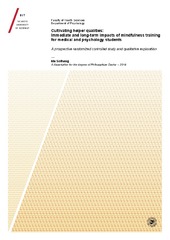Cultivating helper qualities: Immediate and long-term impacts of mindfulness training for medical and psychology students A prospective randomized controlled study and qualitative exploration
Permanent lenke
https://hdl.handle.net/10037/10012Åpne
Thesis introduction (PDF)
Paper I: de Vibe, M., Solhaug, I., Tyssen, R., Friborg, O., Rosenvinge, J. H., Sørlie, T., Bjørndal, A.: «Mindfulness training for stress management: A randomised controlled study of medical and psychology students”. Also available in BMC Medical Education 2013, 13(107). (PDF)
Paper III: Solhaug, I., Eriksen, T. E., de Vibe, M., Haavind, H., Friborg, O., Sørlie, T., Rosenvinge, J.: “Medical and Psychology Student's Experiences in Learning Mindfulness: Benefits, Paradoxes, and Pitfalls”. Also available in Mindfulness 2016, 7(838) (PDF)
Dato
2016-11-11Type
Doctoral thesisDoktorgradsavhandling
Forfatter
Solhaug, IdaSammendrag
This thesis explored the immediate and long-term impact of participating in a 7-week mindfulness-based stress reduction intervention on medical and psychology students.
A significant proportion of healthcare professionals experience distress and stress-related burnout, which have been linked to patient dissatisfaction, worse patient outcomes, and increased rates of medical error. Distress, burnout, and stress can occur early in the educational process, and medical and psychology students report increasing levels of stress and mental distress during educational training.
A randomized controlled trial involving 288 students from two Norwegian universities was conducted and immediate, two- and four-year follow-up effects were evaluated. We also explored participants’ experiences in learning mindfulness using a qualitative approach.
The results indicate that a mindfulness-based intervention can reduce distress and enhance adaptive coping responses and self-reported mindfulness disposition in medical and psychology students both in the short and long run. Short-term gains were only significant for women, while long-term gains were observed regardless of gender. The frequency of practicing mindfulness exercises increased self-reported mindfulness disposition, and increases in mindfulness disposition mediated long-term intervention effects. However, students practiced mindfulness exercises infrequently. The qualitative data highlighted the value and also complexity in learning mindfulness, particularly with respect to developing mindfulness attitudes (i.e. acceptance, non-striving and non-reactivity). Some students perceived mindfulness as a means to improve concentration or achieve relaxation, whilst others reported increased sensitivity and tolerance towards their own state of mind and increased relational presence.
Taken together, the results indicate that a mindfulness-based intervention can reduce distress, enhance adaptive coping responses and boost helper qualities in medical and psychology students. Integrating mindfulness into the education of helpers holds promise.
Beskrivelse
The paper II of this thesis is not available in Munin.
Paper II: Solhaug, I., de Vibe, M., Friborg, O., Sørlie, T., Tyssen, R., Bjørndal, A., Rosenvinge, J.: "Long-term mental health effects of mindfulness training: A four-year followup". (Manuscript).
Paper II: Solhaug, I., de Vibe, M., Friborg, O., Sørlie, T., Tyssen, R., Bjørndal, A., Rosenvinge, J.: "Long-term mental health effects of mindfulness training: A four-year followup". (Manuscript).
Forlag
UiT The Arctic University of NorwayUiT Norges arktiske universitet
Metadata
Vis full innførselSamlinger
Copyright 2016 The Author(s)
Følgende lisensfil er knyttet til denne innførselen:


 English
English norsk
norsk
